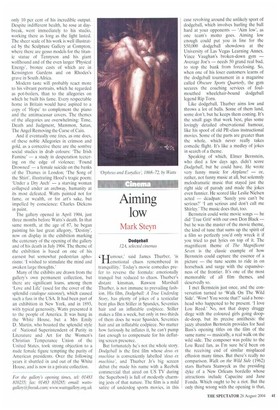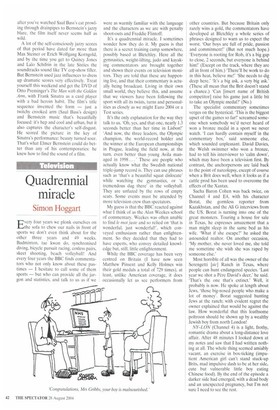Aiming low
Mark Steyn
Dodgeball 12A, selected cinemas
cur umour,' said James Thurber, 'is
1 lemotional chaos remembered in tranquillity.' Today's movie comedies prefer to reverse the formula; emotionally tranquil but reduced to chaos. Thurber's distant kinsman, Rawson Marshall Thurber, is not immune to prevailing fashion. His film, Dodgeball: A True Underdog Story, has plenty of jokes of a testicular bent plus Ben Stiller in Spandex. Seventies hair and an inflatable codpiece. Stiller makes a film a week, but only in two thirds of them does he wear Spandex, Seventies hair and an inflatable codpiece. No matter how furiously he inflates it, he can't pump fast enough to compensate for his deflating screen presence.
But fortunately he's not the whole story. Dodgeball is the first film whose deus ex ma china is conveniently labelled `deus ex machina', and Thurber Jr's big screen debut (he made his name with a Reebok commercial that aired on US TV during the Superbowl) is full of modestly charming jests of that nature. The film is a mild satire of underdog sports movies, in this case revolving around the unlikely sport of dodgeball, which involves hurling the ball hard at your opponents — 'Aim low', as one team's motto goes. Aiming low enough could put you in line for the $50,000 dodgeball showdown at the University of Las Vegas Learning Annex. Vince Vaughan's broken-down gym — Average Joe's — needs 50 grand real bad, to stop the bank from foreclosing. So, when one of his loser customers learns of the dodgeball tournament in a magazine called Obscure Sports Quarterly, the gym secures the coaching services of foulmouthed wheelchair-bound dodgeball legend Rip Torn.
Like dodgeball, Thurber aims low and throws a lot of balls. Some of them land, some don't, but he keeps them coming. It's the small gags that work best, plus some lovingly detailed observational humour, like his spoof of old PE-class instructional movies. Some of the parts are greater than the whole, which never really takes comedic flight. It's like a medley of jokes in search of a theme.
Speaking of which, Elmer Bernstein, who died a few days ago, didn't score Dodgeball, but he could have. He wrote very funny music for Airplane! — or, rather, not funny music at all, but solemnly melodramatic music that stayed just the right side of parody and made the jokes even funnier. He scored like Leslie Nielsen acted — deadpan; 'Surely you can't be serious?' I am serious and don't call me Shirley,' The music does that, too.
Bernstein could write movie songs — he did 'True Grit' with our own Don Black — but he was the master of the movie theme, the kind of tune that sums up the spirit of a film so perfectly you'd only wreck it if you tried to put lyrics on top of it. The magnificent theme of The Magnificent Seven is the classic example of how Bernstein could capture the essence of a picture — the tune seems to ride in on horseback and surge with the expansiveness of the frontier. It's one of the most memorable of all film themes, and deservedly so.
I met Bernstein just once, and the conversation turned to 'Walk On The Wild Side'. 'Wow! You wrote that?' said a bonehead who happened to be present. 'I love Lou Reed.' No, not that dopey druggy dirge with the coloured girls going (loopde-doop, but its precise antithesis: the jazzy abandon Bernstein provides for Saul Bass's opening titles on the film of the same name — musically, a real walk on the wild side. The composer was polite to the Lou Reed fan, as I'm sure he'd been on the receiving end of similar misplaced effusion many times. But there's really no comparison. Walk on the Wild Side (1962) stars Barbara Stanwyck as the presiding dyke of a New Orleans bordello whose attractions include Capucine and Jane Fonda. Which ought to be a riot. But the only thing wrong with the opening is that, after you've watched Saul Bass's cat prowling through drainpipes to Bernstein's jazzy blare, the film itself never seems half as wild.
A lot of the self-consciously jazzy scores of that period have dated far more than Max Steiner or Erich Wolfgang Korngold, and by the time you get to Quincy Jones and Lab o Sehifrin in the late Sixties the soundtracks sound like TV cop-show filler. But Bernstein used jazz influences to dress up dramatic scores very effectively. Treat yourself this weekend and get the DVD of Otto Preminger's The Man with the Golden Arm, with Frank Sinatra as a card player with a bad heroin habit. The film's title sequence invented the form — just a twitchy crooked arm (Saul Bass's design) and Bernstein music that's beautifully focused: it's hep and cool and urban, but it also captures the character's self-disgust. He scored the picture in the key of Sinatra's performance: beauty turned sour. That's what Elmer Bernstein could do better than any of his contemporaries: he knew how to find the sound of a film.



























































 Previous page
Previous page